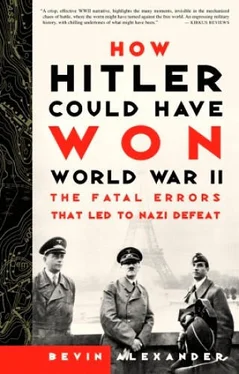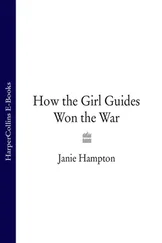The continued failures at Cassino demonstrated the basic mistake of the Allied strategy in Italy. Cassino was important because it barred entry to the valley of the eastward-flowing Liri River, the only route in this part of Italy that could accommodate Allied tanks, artillery, and vehicles. Route 6, the Naples-Rome highway, ran through it.
The Allies tried first to force a crossing of the Rapido a few miles south of Cassino, with the intention of swinging up and around the town and Monastery Hill. This had failed with heavy losses because the Rapido was fast-moving and German artillery could fire from valleys just west of Cassino.
The Allies had also tried to swing around Cassino from the north, but the Apennines in this region consist of rocky escarpments and deep ravines, which limited movement to small bodies of men supplied by mules.
Why did the Allies not swing entirely around Rome and the mountains and land farther up the Italian boot, either on the western or eastern coast? Allied sea power was overwhelming, and an invasion could have been made almost anywhere. It would have been easiest along the Adriatic coast, especially around Rimini or Ravenna in the great Po Valley of northern Italy, where there were no mountains to harbor German defenders, and the terrain would have been better for Allied tanks and other vehicles. But any strategic landing beyond major German troop dispositions—that is, beyond where a landing could be easily contested, not close by as Anzio was—would force an enemy withdrawal from points south.
Churchill was not a great strategist, but he saw the opportunity plainly. He telegraphed Alan Brooke on December 19, 1943: “There is no doubt that the stagnation of the whole campaign on the Italian front is becoming scandalous…. The total neglect to provide amphibious action on the Adriatic side and the failure to strike any similar blow on the west have been disastrous.”
But the Allies had elected to conduct a straight-ahead, direct campaign right through the mountains of Italy, and at Cassino they experienced the bloody consequences of that strategy in full measure.
In cooperation with British General H. Maitland Wilson, who had taken a new post as supreme commander, Mediterranean, in January 1944, Alexander developed another plan to break through the Gustav line. He shifted most of 8th Army westward to take over the Cassino–Liri Valley sector, leaving only a single corps on the Adriatic side of the Apennines. Clark’s 5th Army, along with the French corps, assumed responsibility for the Garigliano River sector along the coast and the Anzio beachhead.
Alexander’s plan was another brute-force effort, to be launched May 11. It called for 8th Army to crack through at Cassino, 5th Army to thrust across the Garigliano, and the Anzio force to break out toward Valmontone on Route 6. Alexander assembled sixteen Allied divisions along the Gustav line against six German divisions (with one in reserve). Twelve were lined up from Cassino to the mouth of the Garigliano, and four were close behind to exploit any breakthrough by thrusting up the Liri Valley in hopes of piercing a second defensive line, six miles in the rear, before the Germans could occupy it.
Three of 8th Army’s nine divisions were armored. Because dry weather had come, the tanks would have far better going than in the wet and muddy winter. In the attack, a Polish Corps of two divisions was to tackle Cassino, while the British 13th Corps of four divisions was to advance about three miles south toward St. Angelo. The attack was supported by 2,000 guns, while all available Allied aircraft made heavy attacks on the German rail and road network.
The offensive opened at 11 P.M., May 11, with a massive artillery barrage. For the first three days the attack made little progress. The Polish Corps suffered heavily, and the American 2nd Corps on the coast and the British 13th Corps likewise had little to show for their efforts. However, General Juin’s French corps, lying between the two, found only one division opposing its four, and made some progress in mountains where the Germans had not expected a serious thrust. On May 14 the French broke into the valley of the small Ausente River, and the German 71st Division fell back fast before them. This relieved pressure on 2nd Corps, and it began to move along the coast road after the German 94th Division. The two German forces were now separated by the roadless Aurunci Mountains. General Juin, sensing the opportunity, sent a division-sized force of Moroccan Goums, natives of the Atlas Mountains, across these mountains to break into the German rear.
The Moroccans pierced the Germans’ second defensive line. The flank along the sea now collapsed, breaking the Gustav line, and the German paratroops at Cassino withdrew on May 17—leaving 4,000 Polish dead in the town and on the slopes of Cassino.
Alexander had ordered forces driving out of the Anzio beachhead to rush past the Alban Hills and block Route 6 at Valmontone, thus cutting off most of the German 10th Army. But Mark Clark wanted the Americans to be first into Rome. When, on May 25, the U.S. 1st Armored and 3rd Infantry Divisions from Anzio linked up with 2nd Corps at Cori, beyond Route 7 but ten miles short of Valmontone, Clark turned three American divisions north along Route 7 toward Rome, sending only one toward Valmontone. Three German divisions held up this division three miles short of Route 6.
Clark found he could not rush into Rome after all, for he was slowed by German resistance on the “Caesar line” of defenses just south of Rome. And 8th Army’s armored divisions were unable to pin the retreating German divisions against the Apennines. They slipped away on roads through the mountains. It looked for a while that General Senger would be able to stop the Allies along the Caesar line, but the U.S. 36th Division pierced it at Velletri on Route 7 on May 30. Clark at once ordered a general offensive—2nd Corps took Valmontone and thrust up Route 6, while 6th Corps rushed along Route 7.
The Germans gave way, and the Americans entered Rome on June 4. Kesselring had declared it an open city in order to prevent destruction.
Alexander’s offensive had gained Rome but little else. The Americans lost 18,000 men in the operation, the British 14,000, and the French 10,000. The Germans sustained about 10,000 killed and wounded, but about 20,000 became prisoners of war. The Italian campaign had not proved a good investment for the Allies. They had committed two soldiers to every German. No Germans had been drawn away from northern France, though without Italy, German strength could have been increased there.
Churchill and Alan Brooke pushed for a campaign to drive into northern Italy, and press through the Ljubljana Gap into Austria, but General Marshall and President Roosevelt ruled instead for Operation Anvil (renamed Dragoon) on August 15—the invasion of southern France, to aid the Normandy operation.
The Italian campaign vanished from the front pages. The fighting was not over. The Allies slowly slogged their way northward. But the killing and the maiming that continued apace no longer played a decisive factor in the war.
21 NORMANDY

IRONICALLY, THE TWO GREATEST ARMORED COMMANDERS IN HISTORY—HEINZ Guderian and Erwin Rommel—clashed on the proper way to meet the Allied invasion of France. Adolf Hitler’s response to that collision largely determined the outcome of the war.
Guderian came to his position from his experiences in the east with the Red Army, Rommel from his experiences in Africa with the western Allies. They proposed diametrically opposite solutions.
Читать дальше



![Джонатан Димблби - Barbarossa - How Hitler Lost the War [calibre]](/books/385421/dzhonatan-dimblbi-barbarossa-how-hitler-lost-the-w-thumb.webp)









